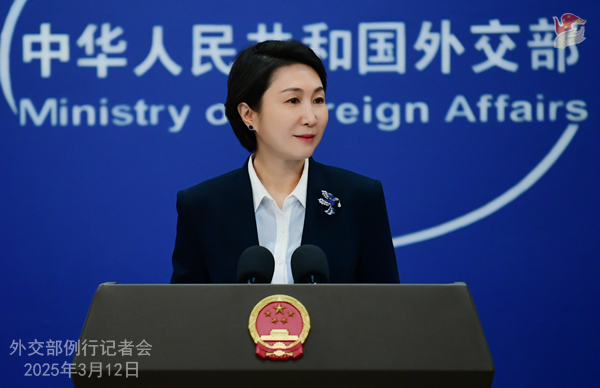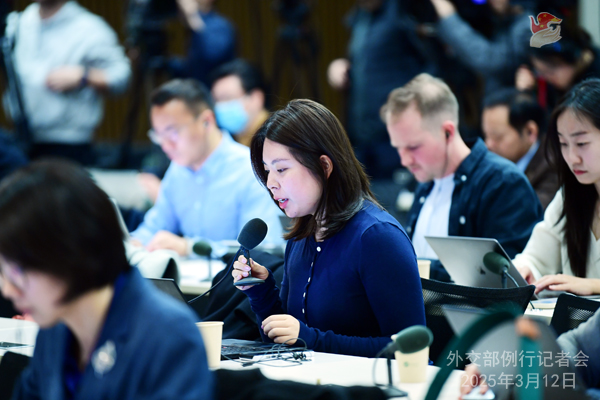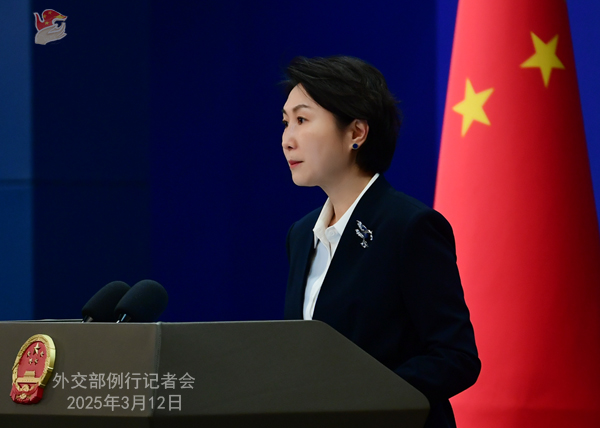
China will hold the Beijing meeting between China, Russia and Iran on the Iranian nuclear issue on March 14. Executive Vice Foreign Minister Ma Zhaoxu will chair the meeting and Russian Deputy Foreign Minister Ryabkov Sergey Alexeevich and Iranian Deputy Foreign Minister Kazem Gharibabadi will attend the meeting in Beijing. The three parties will exchange views on the Iranian nuclear issue and other issues of mutual interest.
The New York Times: Chinese media reports say the Ministry of Commerce has summoned Walmart for pressuring Chinese suppliers to lower prices in response to tariffs. Can you confirm if this is true? And if so, can you offer more details?
Mao Ning: I’d refer you to competent Chinese authorities on that.
People’s Daily: The two sessions just came to a conclusion in China. We noted that many in the international community said the two sessions are a window for the rest of the world to understand China’s whole-process people’s democracy. China’s democratic practice leads to a political path different from that of Western countries, and provides valuable experience and inspiration to the world, especially Global South countries. What’s your comment?
Mao Ning: The two sessions are a vivid practice of China’s whole-process people’s democracy. This year’s two sessions have brought together nearly 3,000 NPC deputies and over 2,000 CPPCC members from diverse backgrounds who represent people’s voice on the top-level platform for the deliberation of state affairs and integrate people’s aspiration into the top design of national development. Nearly 4,000 suggestions and over 2 million online opinions were solicited for the draft of the Report on the Work of the Government, with the aim of most extensively pooling collective wisdom and representing people’s will. After the two sessions were concluded, government departments will comprehensively implement tasks. This is a complete process of public opinion soliciting, consultation and implementation.
Democracy is a common value of humanity and the right of people of all countries. Whole-process people’s democracy is the model of democracy in its broadest, most genuine, and most effective form. It is the people’s democracy most suitable for China’s national conditions and has made important contributions for enriching humanity’s political civilization.
Bloomberg: President Donald Trump rolled out 25-percent tariffs on steel and aluminum imports today. How does China respond and will Beijing retaliate?
Mao Ning: China believes that protectionism leads nowhere, and trade and tariff wars have no winners. This has been widely recognized in the international community. What the U.S. did severely violates the WTO rules, harms the rules-based multilateral trading system, and does no good to solving problems. China will take all necessary measures to defend its lawful rights and interests.
The New York Times: Does China feel that it has had adequate communication with the Trump administration, particularly on trade and other economic issues?
Mao Ning: China believes that the right way is to address each other’s concerns through dialogue and consultation on the basis of equality and mutual respect. China-U.S. trade ties are based on reciprocal interactions. Cooperation will bring about mutual benefit and win-win, and China will definitely take countermeasures in response to arbitrary pressure.

NBC: There are some analysts who compare China’s rhetoric and countermeasures against President Trump and his tariffs and rhetoric and countermeasures from Canada and Mexico for example, and they say China’s responses are actually relatively more restrained. Would you agree?
Mao Ning: China has repeatedly made clear its opposition against the U.S. imposing additional tariffs on Chinese imports, and has taken legitimate and necessary countermeasures to defend China’s rights and interests. Let me reiterate that China-U.S. business relations are based on two-way and reciprocal interactions. Cooperation will bring about mutual benefit and win-win, and China will definitely take countermeasures in response to arbitrary pressure.
Dragon TV: It’s reported that on March 11, terrorists hijacked an express train carrying around 450 passengers in Sibi, Balochistan province of Pakistan. The Balochistan Liberation Army claimed responsibility for the attack. During the ongoing operation to rescue hostages, Pakistan’s security forces freed 104 passengers and gunned down at least 16 terrorists. Prime Minister Shehbaz Sharif condemned the attack, saying that the security forces are eliminating the terrorists. What’s China’s comment?
Mao Ning: We noted the reports and strongly condemn this terrorist attack.
China firmly opposes terrorism in any form. We will continue to firmly support Pakistan in combating terrorism, maintaining solidarity and social stability, and protecting the safety of the people. China stands ready to strengthen counterterrorism and security cooperation with Pakistan and jointly keep the region peaceful, secure and stable.
AFP: Ukraine said it is ready to accept a U.S. proposal for an interim 30-day ceasefire in the war with Russia. What’s your response?
Mao Ning: We noted relevant reports. China has been calling for political settlement through dialogue and negotiation since the first day of the crisis, and has been actively working for peace and pushing for talks. We hope that parties concerned will find a sustainable and lasting solution for peace that accommodates each other’s concerns through dialogue and negotiation.
